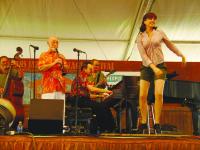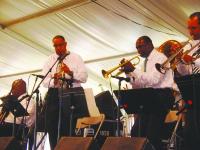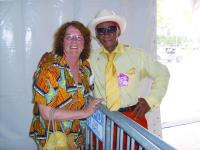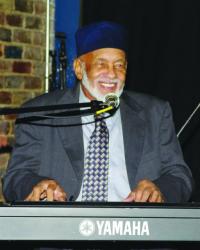Every year I make sure to catch the shows of my favorite musicians who are getting up there in age. The first person in this category to come to mind is Pete Fountain. Like far too many locals, Pete Fountain lost all his worldly possessions to the storm and then suffered major heart problems post Katrina and had open heart surgery. I’m delighted to report that Pete is alive and well and sounds as good as ever.
I remember my Dad playing Pete Fountain 78-speed records as a young child growing up in the ‘50s. I started going to New Orleans in the late ‘70s and always enjoyed Pete’s shows at his club on Bourbon Street. This darling gentleman has recorded over 100 albums and can play a clarinet as sweet as you’ve ever heard; his unique style is called ‘Swinging Dixie.’ This native from N’awlins played at the very first Jazzfest and to my knowledge, he’s never missed a festival. Pete has mentored so many fine younger musicians like clarinetist Tim Laughlin. Pete’s show this year was especially endearing as he had his granddaughter tap dancing on stage with him. Last time she had done this was when she was about 5 years old at the World’s Fair held in New Orleans in the early ‘80s.
Another of my favorite clarinetists is Dr. Michael White who lost his home and perhaps the finest collection of early jazz memorabilia to Katrina in ‘05. He has suffered yet another loss as his dear Mother died several weeks prior to his performance at Jazzfest this year. Like so many Katrina survivors, his Mom had been independent and in good health before the storm. Afterwards she went downhill fast with dementia and was bed-ridden the past two years. Dr. Michel White has dealt with bouts of depression since the storm. He dedicated his first number to his Mom and played most soulfully and beautifully “If You See My Mother,” by Sidney Bechet.
The final day of Jazzfest, Dr. Michael White gave another performance paying tribute to Sidney Bechet who passed on fifty years ago but his music so lives on. Michael is a leader in keeping traditional jazz alive as is clear on his most recent CD entitled Blue Crescent where he plays New Orleans jazz the way it was played 100 years ago. Not the same notes, mind you, but the same feel for that great music and its roots, as Dr. White deals with the pain and aftermath from Katrina in this contemporary music played in traditional style. Several months before Jazzfest, Michael was honored by receiving the nation’s highest recognition for folk and traditional arts, the NEA National Heritage Fellowship Award.
In recent years, I have always attended “Piano Night” held the Monday between Jazzfest weekends at the House of Blues as a benefit for my favorite radio station of all times, WWOZ, which is owned by the Jazz and Heritage Foundation. I didn’t go this year for two reasons. First, my long time friend and favorite Bluesman Bryan Lee, known as The Braille Blues Daddy, and his dear wife Beth invited me to dinner that night and we just had a grand time catching up on our “goings ons” since he played a show for my TUUC Friday Concerts last October. I’ll write more about Bryan and his Jazzfest show in a future column and hopefully announce a date for him to perform in our fair city.
The second reason why I didn’t want to go to “Piano Night” this year was because I had just learned about Eddie Bo’s death the month before. Now “Piano Night” features a whole slew of great pianists playing everything from cakewalks, rags, and chios to the latest and hottest piano funk. However, the highlight of the evening was always without the slightest doubt, Eddie Bo’s stellar performance and his battling pianos with Marcia Ball. I can just see him now, waving to an upcoming musician to join him at the keys so he could then get up and give the audience his own unique style of greeting and buckjumpin dance. He always ended the evening with his long-time wife escorting him off the stage while he continued to dazzle us all with his charm and infectious smile.
Born in 1930, Bo came from a family of musicians including his Uncle Pete who played with Sidney Bechet and King Oliver. Eddie was one of New Orleans’ last living links to “Junkers” piano style which he learned from his Mom. Eddie Bo wrote many top hits including Little Richard’s “Slippin‚ and Slidin‚” Etta Jamess’ “My Dearest Darling,” “Check Mr. Popeye,” “Check Your Bucket” (later he used this as the name of his club), “Rockin‚ Pneumonia,” “Fallin‚ in Love Again,” “Every Dog Got Its Day,” and the list goes on. Eddie Bo followed his passion and changed with the times going from Jazz to R&B to being one of the forerunners in funk. He was a hip cat who will surely be missed and well remembered.
Check out the picture of me with Little Freddie King just after his show at Jazzfest this year. I just adore this bluesman who hails from Mississippi. He visited New Orleans for a school picnic and returned home to tell his Mom how much he loved the city and he was going right back for good. That was back in the early ‘50s and NOLA (New Orleans, LA) has been his home ever since. He taught himself the finer points of blues by playing his 45 records of blues greats at 33 speed to slow the music down so he could catch all the notes. Freddie’s gutsy lo-fi music with his gravelly hard life voice is highly influenced by John Lee Hooker and Lightnin’ Hopkins. Little Freddie is the first musician to record an all electric blues album in New Orleans. Yes, Little Freddie King led a very hard life indeed and finally did a turnaround in the mid ‘80s when he stopped drinking. He lost everything in Katrina and was one of the first musicians to return to New Orleans and move into the Musicians Village now being built in the devastated ninth ward. Freddie is an early riser these days and can often be seen riding his bike through the quarter with his guitar tucked under his arm.
Little Freddie played at the very first Jazzfest and has performed at every one since. I had the pleasure of seeing Freddie at Jazzfest and at a show he gave at The Louisiana Music Factory. Freddie, backed up by his long-time band members, gave his usual high energy, raw and captivating performance using only his treasured B.B. King Lucille Gibson guitar. Oh, how he can play! As always, Freddie looked quite dapper in his Canal Street finery. Check out his attire - see the big collar on his yellow shirt with cuffs and the wide yellow tie - how about those orange pleated polyester pants and turquoise shoes. Of course Freddie was wearing his signature Panama hat with a sweat bandana underneath. Perhaps he wore this outfit at his first Jazzfest 40 years ago. The man definitely has his own unique style of music and attire. If you have a hankering for real genuine down home blues, pick up Little Freddie King’s latest album Messin Around the House.
I sure hope you’ve enjoyed reading this article and will perhaps visit
www.louisianamusicfactory.com to purchase CDs from these New Orleans legends. Please pick up next week’s paper for more Jazzfest Greats Remembered.



